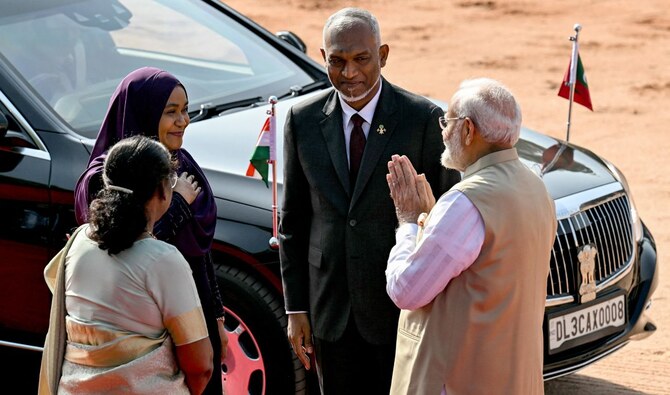NEW DELHI: Maldives President Mohamed Muizzu is expected to talk Monday with Indian Prime Minister Narendra Modi in New Delhi as he aims to repair ties between the countries that have been strained since he came to power last year.
Muizzu and Modi are expected to discuss “bilateral, regional, and international issues of mutual interest,” according to India’s foreign ministry. Muizzu will also hold meetings with senior Indian officials during his five-day India visit.
Tensions between India and Maldives have grown since pro-China Muizzu came to power last year after defeating India-friendly incumbent Ibrahim Mohamed Solih.
Leading up to the 2023 elections, Muizzu had promised to expel Indian soldiers deployed in Maldives to help in humanitarian assistance. In May, New Delhi replaced dozens of these soldiers with civilian experts.
Ties were also strained in January when some Maldivian leaders lashed out at Modi for promoting India’s Lakshadweep archipelago for Indian travelers. Lakshadweep is off the southwestern coast of the Indian mainland.
Maldivian leaders saw the move as a way to lure Indian tourists away from their country and encourage them to visit Lakshadweep instead. It sparked angry protests from Indian celebrities who called for a tourism boycott to Maldives. Tourism is the mainstay of the Maldives’ economy.
The dispute deepened when Muizzu visited China ahead of India in January, a move which was seen as a snub to New Delhi. On his return, Muizzu spelled out plans to rid his tiny nation of dependence on India for health facilities, medicines, and import of staples.
A thaw ensued after Muizzu attended Modi’s June swearing-in ceremony in New Delhi for a third five-year term. Since then, Muizzu has toned down his anti-Indian rhetoric, and official-level contacts have intensified with New Delhi.
India’s foreign minister, Subrahmanyam Jaishankar, on Sunday said he was confident Muizzu’s talks with Modi would give “a new impetus” to the “friendly ties” between the countries.
Regional powers India and China compete for influence in the archipelago nation, which is strategically located in the Indian Ocean.
For decades, India has been a critical provider of development assistance to the Maldives, including infrastructure projects, medical care, and health facilities. Meanwhile, Maldives is part of China’s “Belt and Road” initiative to build ports and highways and expand trade, as well as China’s influence across Asia, Africa, and Europe.
Muizzu’s visit to New Delhi is essential for Modi, who is facing a challenging time in neighborhood diplomacy with Marxist politician Anura Kumara Dissanayake taking over as Sri Lanka’s president and India-friendly Bangladesh Prime Minister Sheikh Hasina fleeing to India in August after being forced to resign by students-led protests. Nepal also now has pro-China K.P. Sharma Oli as its prime minister.
Experts say India needs to maintain close ties with Sri Lanka, Bangladesh, Bhutan, Nepal, and the Maldives, which are its traditional spheres of influence.


















